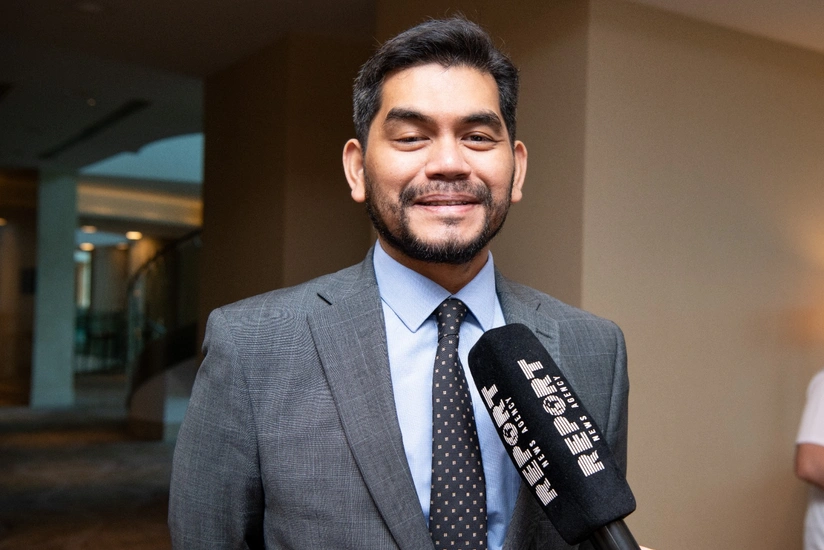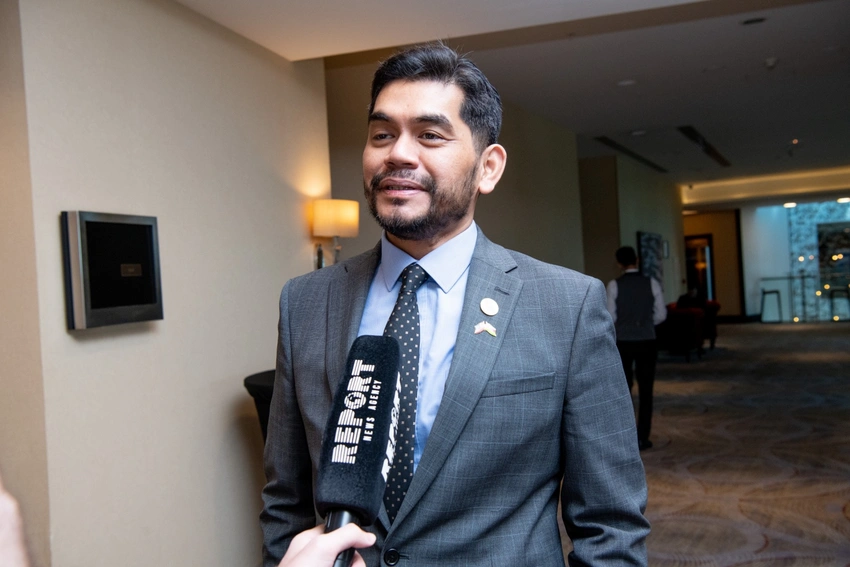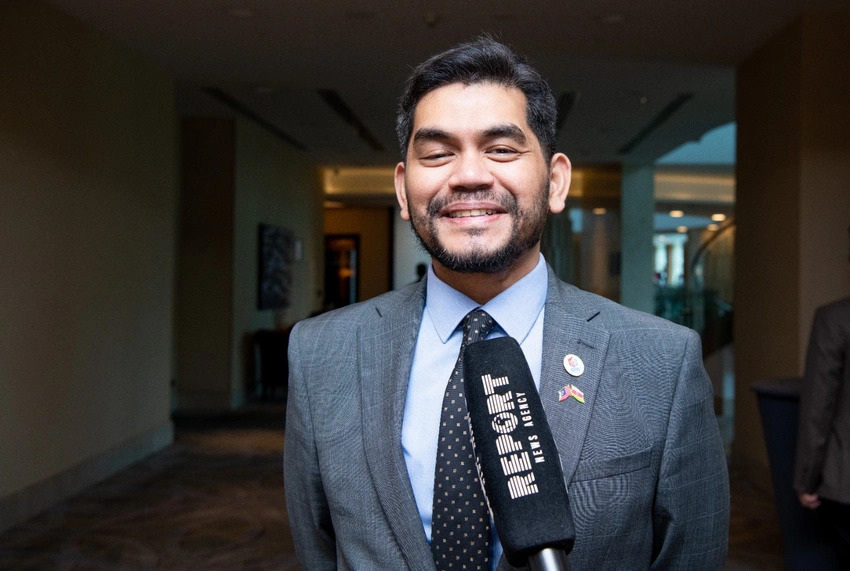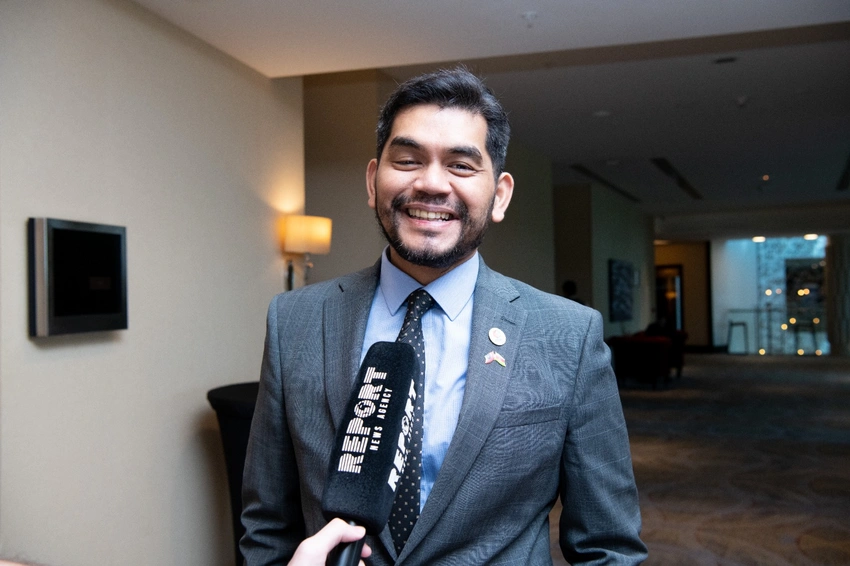Ambassador: Azerbaijan may become strategic hub for Malaysian companies to enter regional markets - INTERVIEW
- 29 August, 2025
- 13:53

Azerbaijan and Malaysia are strengthening their bilateral relations, going beyond traditional diplomatic interactions and focusing on expanding cooperation in strategic areas. Both countries demonstrate strong political will to develop multi-level partnership, including on international platforms of the UN, the Organization of Islamic Cooperation (OIC), D-8 and the Non-Aligned Movement.
Particular attention is paid to the opportunities for Malaysian companies to participate in energy and green projects in Azerbaijan, as well as expanding bilateral contacts at the business community level. The parties are also considering potential in tourism, agro-industry and digital economy.
Ambassador Extraordinary and Plenipotentiary of Malaysia to Azerbaijan Ahmad Kamrizamil Mohd Riza in an exclusive interview with Report spoke about the current state of relations, partnership prospects and upcoming visits of high-ranking delegations.
- How would you describe the current state of political relations between Azerbaijan and Malaysia? What steps are being taken by both sides to further strengthen bilateral dialogue and coordination on international platforms?
- The current state of relations between Azerbaijan and Malaysia is marked by positive engagement and a shared commitment to enhancing bilateral ties. Both countries maintain diplomatic relations grounded in mutual respect and cooperation, with ongoing efforts to expand collaboration across various sectors. Bilateral ties between our countries are strengthened through meetings such as Bilateral Consultation, high-level visits, technical visits, and participation in multilateral forums.
To further strengthen bilateral ties and coordination on international platforms, both our countries have also been actively engaging in multilateral meetings and strategic partnerships within organisations such as the UN, the Organisation of Islamic Cooperation (OIC), D-8, and the Non-Aligned Movement.
Both sides are focused on aligning positions on key global issues, promoting mutual interests, and supporting each other"s initiatives in these forums.
Additionally, there are also ongoing efforts to enhance interparliamentary exchanges and facilitate cooperation in areas such as trade, investment, and cultural ties. These efforts, which collectively contribute to a more positive and dynamic bilateral relations, reassure us of the commitment to strengthening our relations.
These initiatives underscore the commitment of both countries not only to sustain, but also to elevate their political ties as we navigate common challenges and opportunities in the international fora.
- How would you assess the current state of bilateral economic relations between Malaysia and Azerbaijan? Which priority areas of cooperation, in your opinion, hold the greatest potential for development in the near future? Are there any ongoing negotiations on the signing of new intergovernmental agreements or memorandums of understanding in key sectors such as trade, energy, or tourism?
- The current state of bilateral economic relations between Malaysia and Azerbaijan remains relatively modest; however, we are confident they are showing promising potential with the growing cooperation between our stakeholders.
From January to July 2025, bilateral trade totalled $6,912,883.00, with Azerbaijan exporting approximately $27,314.00 to Malaysia, primarily optical and scientific equipment; textiles, apparels and footwear; manufactured products; vegetable oils; and agriculture products. In return, Malaysia exported around $6,885,569.00 worth of goods to Azerbaijan, including palm oil-based manufactured products; electrical and electronic products; rubber products; machinery, equipment and parts; and optical and scientific equipment.
Looking ahead, I am confident that priority areas for future cooperation are energy and renewable energy, given Azerbaijan"s rich resources and its renewable and sustainable energy agenda, as well as Malaysia"s growing and established energy sector. I also foresee a potential increase in trade for agriculture-based products, such as palm oil, as well as machinery and industrial equipment.
Tourism has significant potential, as evidenced by the increase in both Azerbaijani tourists to Malaysia and Malaysian tourists to Azerbaijan for the first six months of 2025.

To enhance the current bilateral state between the two countries, ongoing bilateral consultations will continue to explore expanding collaboration in key sectors. Both countries recognize the importance of formalizing this momentum through potential new agreements in the near future.
- In 2022, the Malaysian energy company Petronas ended its participation in the Shah Deniz project and closed its office in Azerbaijan. Does the company plan to resume operations in the region or participate in new oil, gas, or energy initiatives in Azerbaijan? Considering the global trend toward green energy, are Malaysian companies exploring opportunities to invest in renewable energy projects in Azerbaijan?
- There is an ongoing effort by Petronas regarding its current plans for overseas expansion. I am confident that there is still potential for collaboration, given Azerbaijan"s strategic position and ongoing projects, especially as a key energy supplier to Europe.
Petronas has a track record of successful international partnerships, and if opportunities arise in Azerbaijan, it could be presented as a compelling case for potential cooperation in the future.
As you mentioned, one of the most exciting and immediate opportunities lies in Azerbaijan"s dynamic renewable energy sector. The government is making a serious commitment to this transition, with ambitious targets that are highly attractive to investors and solution providers.
Azerbaijan aims to increase the share of renewable energy in its installed capacity to 33.7 percent by 2027, a significant jump from 21.3 percent at the end of last year. This aggressive goal is backed by a pipeline of projects, including wind farms and solar parks. This green push is not just about meeting domestic needs; it is also about strengthening Azerbaijan"s role as a hub for green energy in this region.
This ambitious green agenda creates a perfect synergy for collaboration with Malaysian companies. Malaysia is actively promoting its green sector through a series of forward-thinking national strategies. The Ministry of Investment, Trade & Industry (MITI) is encouraging companies to leverage opportunities and expand their capabilities in this sector through policies such as the New Industrial Masterplan (NIMP) 2030, the Green Investment Strategy, the Circular Economy Policy Framework, and the National Trade Blueprint (NTBp) 2030. These policies, along with a focus on a circular economy and sustainable trade, are driving innovation and expertise that are directly relevant to Azerbaijan"s renewable energy goals.
We highly encourage companies in Azerbaijan to explore these collaboration opportunities with Malaysian companies by visiting two key events in Kuala Lumpur:
● Oil & Gas Asia (OGA): This is Southeast Asia"s premier energy event, featuring over 2,000 exhibitors from 40 countries and providing a great platform to showcase the latest technologies. It will be held from 2 September to 4, 2025.
● International Greentech & Eco Products Exhibition and Conference Malaysia (IGEM): IGEM is the region"s leading trade event for green technologies, showcasing solutions in renewable energy, energy efficiency, and sustainable infrastructure. It will be held from 15 October to 17, 2025.
For further information and to facilitate these connections, please reach out to us.
- Are any high-level bilateral visits planned between Malaysia and Azerbaijan in the near future? Can we expect an official visit by a head of state, government, or foreign minister from either side? To what extent could such visits contribute to deepening the political dialogue and expanding economic ties between our countries?
- In recent years, Malaysia has actively engaged with Azerbaijan through a series of high-level visits, reflecting our firm commitment to enhancing bilateral relations. In 2024 alone, we had the honour of receiving several important delegations from Malaysia to Azerbaijan.
These included the visit of Senator Datuk Mutang Tagal, President of the Senate, as well as Senator Datuk Nur Jazlan Tan Sri Mohamed, the Deputy President of the Senate. We also welcomed YB Tuan Nik Nazmi Nik Ahmad, Minister of Natural Resources and Environmental Sustainability, and YB Tuan Nga Kor Ming, Minister of Housing and Local Government, both of whom participated in the COP29-UNFCCC held in Baku.
Building on this momentum, 2025 has already witnessed further exchanges. In April, our Deputy Minister of Foreign Affairs visited Baku to co-chair the 2nd Malaysia–Azerbaijan Bilateral Consultation. This was followed by the visit of the Auditor General of Malaysia in July.
Looking ahead, we anticipate the visit of our Minister of Communications in November for the World Telecommunication Development Conference 2025 (WTDC-25), as well as a potential visit by our former Prime Minister Tun Mahathir Mohammad, who has been invited to participate in the Greater Caspian Summit 2025.
While we are pleased with the increasing number of high-level visits from Malaysia to Azerbaijan, we note that reciprocal visits from Azerbaijan to Malaysia have not occurred in recent years. We sincerely hope that Azerbaijan will consider undertaking more frequent high-level visits to Malaysia in the near future, as this further demonstrates the mutual commitment to deepening our ties.
Additionally, we look forward to receiving the Minister of Economy of Azerbaijan, the Speaker of Milli Majlis, and the Minister of Foreign Affairs of Azerbaijan, who are planning their official visits to Malaysia later this year.
We regard these incoming high-level visits as a very positive development and a clear indication that our bilateral relations are moving in a stronger and more dynamic direction.
- Is there any discussion regarding the establishment of a bilateral intergovernmental commission on economic, scientific-technical, and cultural cooperation between Malaysia and Azerbaijan? In your opinion, how could such a structure contribute to systematising and expanding cooperation in priority areas?
- Thus far, there have been no formal discussions regarding the establishment of a dedicated intergovernmental commission on economic, scientific, technical, and cultural cooperation between Malaysia and Azerbaijan.
However, I wish to emphasise that, despite the absence of a formal mechanism, both countries have been actively engaging through platforms such as bilateral consultations to discuss these key areas of mutual interest. These discussions reflect a firm commitment from both sides to explore opportunities for collaboration and to strengthen ties in economic development, technological innovation, and cultural exchanges.

Through bilateral consultations, our countries continue to lay the groundwork for potential future activities and partnerships that could enhance cooperation in trade, investment, scientific research, and people-to-people ties.
Under my steerage, I also plan to formalise the Malaysia-Azerbaijan Business Working Group, which is currently very informal in nature. Formalising the working group will encourage more Malaysian and Azerbaijani business entities to cooperate and exchange views on the potential for doing business in both countries. I genuinely hope we will be able to achieve it by the end of 2025.
- Both countries actively participate in influential multilateral platforms such as the Organisation of Islamic Cooperation (OIC), D-8, and the Non-Aligned Movement. In your view, what initiatives could promote deeper coordination of positions and practical cooperation between Malaysia and Azerbaijan within these organisations? Do you see potential for joint humanitarian, educational, or climate-related projects within these frameworks?
- Both Malaysia and Azerbaijan are actively involved in multiple multilateral platforms, such as the United Nations, the Organisation of Islamic Cooperation (OIC), the D-8, and the Non-Aligned Movement (NAM), which provides a solid foundation for enhancing bilateral coordination and technical cooperation between the two countries.
There is also strong potential for joint initiatives in humanitarian, educational, renewable energy, Islamic finance and climate-related projects within these frameworks.
Humanitarian cooperation could focus on responding collectively to crises affecting Member States, such as refugee assistance or disaster relief, leveraging on both countries' unique regional expertise.
Meanwhile, educational cooperation can be enhanced through scholarship programs, exchange of students and academics, and joint research initiatives targeting socio-economic development and technological innovation among member countries.
On climate action and renewable energy, both countries can partner on sustainable development projects addressing shared challenges, such as water management, energy, and environmental conservation, thereby reinforcing commitments made under the frameworks of the OIC and D-8.
In Islamic finance, Malaysia can lend its expertise to Azerbaijan, as the country has been considered one of the best Islamic finance systems for the last 20 years.
Such collaborative efforts would not only deepen Malaysia-Azerbaijan ties but also contribute to the broader goals of these multilateral platforms by fostering capacity building and sustainable development among their members.
- Malaysia has unique expertise in Islamic finance, halal certification, and the development of the digital economy. How relevant are these areas for Azerbaijan in terms of attracting expertise, investment, or establishing joint ventures? Is there interest from Malaysian businesses in expanding their presence in the Azerbaijani market, including in free economic zones and industrial parks?
- Malaysia holds a leading position in the global halal economy, consistently ranking at the top of the Global Islamic Economy Indicator (GIEI) for over a decade. This strong performance is driven by government support and a robust ecosystem, which includes a highly credible and internationally recognised halal certification system, expertise in Islamic finance, and a well-developed network of halal parks.
In 2024, Malaysia"s halal product exports reached approximately $13.4 billion and are projected to reach $14.1 billion in 2025. The Halal Industry Master Plan 2030 (HIMP 2030) sets a target for halal exports to reach RM70 billion by the end of the decade, with the industry"s contribution to the nation"s GDP expected to rise significantly to 11 percent. This solidifies Malaysia"s role as not only a major producer and exporter of halal goods but also as a global hub for the halal industry.
In the same vein, the Malaysian government, through its missions abroad, MITI and MATRADE, is actively encouraging Malaysian companies, exporters and service providers to explore opportunities in the global halal industry by collaborating with foreign companies and leveraging new investment areas.
For this reason, we strongly encourage Azerbaijan companies to join the 21st Malaysia International Halal Showcase (MIHAS), which will be held September 17-20, 2025, in Kuala Lumpur.
Azerbaijani companies should seize the opportunity to participate in MIHAS 2025, both as exhibitors and buyers, to tap into the booming global halal market.
As an exhibitor, this is a prime opportunity to build brand credibility, identify new business opportunities by connecting with a diverse audience, and network with potential investors. Last year"s event attracted over 43,000 visitors from 90 countries, providing vast opportunities to meet the right business partner.
For buyers, the event is an unparalleled sourcing platform to meet export-ready Malaysian companies. In addition, MIHAS 2025 is expected to be even bigger, with more than 2,000 booths from 45 countries, featuring 14 halal industry clusters, including food and beverages, Islamic finance, modest fashion, pharmaceuticals, and tourism.
In 2024, the event generated a total of $1.1 billion in sales. With a larger scale anticipated, MIHAS 2025 presents an ideal environment for Azerbaijani businesses to forge new partnerships, discover innovative Malaysian products, and stay ahead of global trends in the halal industry.
- Given Malaysia"s global leadership in palm oil production, are there any discussions or feasibility studies underway regarding the establishment of palm oil processing or production facilities in Azerbaijan? How do both sides assess the potential for agricultural or agro-industrial cooperation in this context?
- Currently, there are no discussions underway regarding the establishment of palm oil processing or production facilities in Azerbaijan. This is mainly because Azerbaijan already boasts advanced companies specialising in fat processing and food production that effectively utilise palm oil in their operations. These established industries provide a strong foundation for the use of palm oil without the immediate need for local processing plants.
The Malaysian Palm Oil Council (MPOC) plays an active role in fostering cooperation with major Azerbaijani companies, working closely to explore new market development opportunities. Together, MPOC and its Azerbaijani counterparts are engaged in comprehensive media awareness campaigns aimed at promoting the benefits and applications of Malaysian palm oil. These initiatives help to strengthen market presence and enhance the understanding of the value offered by sustainable Malaysian palm oil products.

Additionally, representatives from Azerbaijani companies frequently visit Malaysia for discussions with MPOC management. These meetings focus on strategies for further expanding bilateral cooperation, emphasising not only trade growth but also knowledge sharing, technical collaboration, and exploring potential opportunities for future cooperation.
We are confident that both sides remain committed to deepening the partnership, having recognised the significant opportunity to leverage Malaysia's global leadership in palm oil production alongside Azerbaijan's growing agro-industrial sector.
- Could you share updated figures on the number of Malaysian companies currently operating in Azerbaijan and vice versa - Azerbaijani companies present in Malaysia? In which sectors are they most active, and are there specific incentives or barriers affecting their market entry?
- While the number of Malaysian companies in Azerbaijan is relatively small, some entrepreneurs are active in sectors such as energy, green technology, trading, and training. At the same time, the MATRADE office in Istanbul is actively encouraging more Malaysian exporters to explore the market and position Azerbaijan as a gateway to the regional market.
Conversely, we encourage Azerbaijani companies to visit Malaysia during strategic trade events to connect with Malaysian exporters, service providers, and potential investors. This partnership is a key step towards building stronger economic ties and fostering mutually beneficial collaborations in emerging sectors in Azerbaijan.
- Does Malaysia see strategic interest in cooperating with Azerbaijan in the fields of liquefied natural gas (LNG) or liquefied petroleum gas (LPG)? Are there any ongoing dialogues or expressions of interest from Malaysian energy firms in these areas?
- Malaysian companies would be interested in exploring cooperation in Azerbaijan"s LNG and LPG sectors, if given the opportunity.
Azerbaijan, a major energy supplier, is strategically positioned to meet the growing energy demands of Europe through its sophisticated pipeline infrastructure.
This presents opportunities for Malaysian companies to provide expertise and services in areas such as midstream infrastructure, gas processing technology, storage solutions, and other relevant industry sectors, where Malaysia, with its robust oil and gas sector, has considerable experience.
To help foster these connections, Azerbaijani companies are strongly encouraged to actively promote and engage with Malaysian companies at key industry events such as Oil & Gas Asia (OGA) 2025 in Kuala Lumpur. They can also leverage the services of MATRADE Istanbul, which serves as a vital bridge for facilitating connections with Malaysian exporters and service providers. This proactive engagement is essential for unlocking the potential for mutually beneficial partnerships in Azerbaijan.
Interested Azerbaijani companies can also contact us at the Embassy for information, and we are ready and glad to assist.
